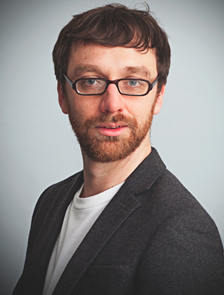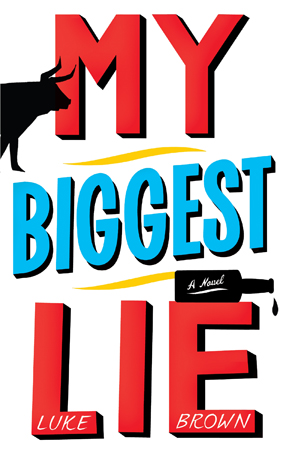The true lives of Luke Brown
by Emma YoungEditor Luke Brown turns author with his debut novel My Biggest Lie, about a man who wakes up after a disastrously drunken night in which he loses his job and girlfriend and decides to flee to Argentina to get his life back on track. Nothing goes to plan, of course, and Liam creates havoc in Buenos Aires, a city full of temptation and never likely to provide him with the salvation and second chances he was looking for. My Biggest Lie is brilliantly written, funny and will give you a hangover by proxy.
EY: I thought I’d begin by quoting this bit of your book back at you, you know, to relax you: “There is nothing noble about reading novels. It is an escape, a throwing-off, an evasion. We are not good people.” Why did you decide to further enable this ignoble behaviour by adding to the novels to be read?
LB: To celebrate the danger of fiction. To rejoice in louche literary endeavour. To suggest that the reason writers write is to show off as well as to communicate. To admit that monstrous egotism and deep selfishness may not be incompatible with imaginative kindness…
The book is perhaps about the good and bad of imagination, of how we tell stories about our character. If compassion and love arise, like Iris Murdoch suggests, “out of the extremely difficult realisation that something other than oneself is real”, then trying to imagine what it’s like to be someone else is a noble thing. But you can also imagine yourself to be various different people, with the bad people you are redeemed by the good people you think you are, the good people who haven’t had a look in for a long time.
I thought this type of lie was a good subject to explore. And to what extent love might always be a lie, and whether it might derive its power specifically because it’s a lie, something we can choose or not choose to believe in.
You really stick it to authors, as well as the publishing industry at large. You call them ‘Twitterers’, ‘shitheads’, ‘sociopaths’ and a myriad other names, which I imagine you’ve been uttering under your breath in the day job for years. It’s a love-hate relationship, right? Can you talk a bit about that, your role as a publisher, and making the (temporary) transition to the dark side?
Until a year and a half ago I worked as an editor at a small press in Birmingham. We were Arts Council funded and published English literary writers from outside of London. So I was always outside of the London publishing world, and then, when our novels started winning prizes, and we formed allegiances with bigger independents, I found myself quite fascinated by the glitz of the parties I could go to and the allure of the characters I met there. They didn’t have to be particularly glitzy parties or alluring characters for me to be impressed – I’d been stuck in a room with two people in Birmingham for most of my career.
In My Biggest Lie I imagine how it might have gone to my head if I’d been thrown all the way into this world, and been given the worst possible role models as a guide to it. One of my friends in publishing has named himself as this terrible role model, but he’s being too unkind to himself.
There aren’t any editors working in publishing who don’t like books, or who are doing it to get rich, so you couldn’t do the job unless you loved writing.”
My editor-narrator Liam declares how much he hates writers, but it’s done with a huge amount of irony. There aren’t any editors working in publishing who don’t like books, or who are doing it to get rich, so you couldn’t do the job unless you loved writing, which presupposes loving writers. There might be some editors with terrible taste, I suppose, but if there are they don’t know their taste is terrible, they’re not doing it on purpose. It’s such an awfully fraught endeavour. You want everything for the author’s book, and they have invested such huge hope it in themselves, but there’s so much about the reception of the book that is out of your hands – the conservative aesthetics of many books pages, the variable quality of judging panels, the arbitrary decisions of buyers for book chains. In this atmosphere it’s quite easy for a writer to become hostile to their publisher, and in my book for Liam to become hostile to his writers. I always had impeccable relationships with my writers, perhaps partly because I was sublimating any rage I felt into this particular fiction.
Now I work as a freelance editor on books other editors have commissioned, so I no longer have the same responsibility for their careers. And I have become what I hated: the writer who sends passive-aggressive emails to my publisher, asking why I am not the lead review in the Sunday Times.
Some people have suggested that there is more than a hint of Luke Brown in Liam, a publisher who’s moved to London after making a name for himself at a small Birmingham publishing house, and yet he’s a self-confessed ‘dickhead’ and occasionally – OK, frequently – not very likeable. I love the section early on when, in talking about the father of Sarah, the girlfriend Liam doesn’t treat particularly well, he says: “I wanted to ring him up and offer to help him beat the crap out of me.” Can you talk about creating Liam’s character? Is he the alter ego who haunts your hangovers?
“The alter ego who haunts my hangovers” is a marvellous way of putting it. He shares a lot of my attributes, of course, many details of my biography, and indulges in many of my vices too. He’s exaggerated, and exaggerates himself – he’s not nearly as pathetic as he claims, and he has a sort of wheedling charm that if I caught myself engaged in I’d try to put a stop to. But I probably wouldn’t catch myself. The book might suggest that we never really penetrate the lies around our character, never really decide between the different people we pretend to be – and in the end really become, because character is probably always to some extent a performance and we are nothing more than our performances.
To me, at least, the novel’s all about the relationships you have with your parents, colleagues, friends, partners – and yourself. Liam’s preoccupied with looking for father figures, reassurance, a better way of living with himself and behaving towards other people. The way you write about Liam’s father is deeply affecting, particularly when you talk about Liam realising he’d never thought about the damage done to his father, only of the damage the father has inflicted on Liam and his family.
Liam’s a sucker for a role model, as I certainly was when I was growing up, both with people my own age and older. Perhaps one of the nicer aspects of Liam’s personality is how much he loves people, how much hope he invests in friendship, how much meaning.
However, he’s attracted to interesting people more than moral people, and so his own character is influenced for the worse (morally). Perhaps a lot of moral people show themselves to be interesting in a less immediate way than immoral interesting people. To someone as childish and meretricious as Liam, as susceptible, this is the case.
Some of this might be down to his relationship with an absent father. If a parent leaves a family the child can only judge him then as a child. He hasn’t had the opportunity to face any of the moral dilemmas the father will have faced. Liam begins the novel judging his father as a child and ends the novel judging him as an adult. Whether that’s a moral progression or a moral decline is debatable, but I personally think the imaginative leap Liam has to take is one towards maturity.
I don’t imagine creating a picture of the London publishing world was too much of a stretch, but how did you go about creating an – I’m assuming – authentic portrait of Buenos Aires in the book? Did you ‘have’ to go there? Rely on research?
Several years ago I spent a month in Buenos Aires, where an English friend was getting married to an Argentine woman. I’ve taken quite a lot from this trip and put it straight into the book. My terrible Argentine Spanish. The fact I only took translations of Argentine masterworks to read on my holiday and was too homesick to get through more than a few pages of them. The hostel I stayed in with its tragic broken men, annoying gap-year kids and terrible library.
I’d already published a short story about the place before I started this novel. I remember it being such a bookish, sexy city. On every other street it seemed there was a bookshop next to a lingerie store and a psychoanalyst. That just struck me as the plot for a novel in itself.
The stereotype of Argentine culture is one dominated by viveza criolla – native cunning – as exemplified by Maradona’s ‘hand of God’. I thought it would be deliciously ironic for someone trying to recover from telling lies as well as from hedonism to be confronted by a world more honest about dishonesty, less unrealistic about its claims to virtue.
Finally, allow me one writerly question: what are you going to write next? Red squiggles in the margins or another book of your own?
I’ve been coming to London every other weekend for years, but have only lived here for a year, and I’m still quite inspired by the place and flitting between two novels set here. I’m writing a comedy about a young man trying to win a young woman from a much older man, and wondering what, if anything, he has to recommend himself over the older man. He’s a feckless hipster who rides a bike and works in a bookshop. There’s not enough fiction about riding bikes, I’ve decided. And the other novel is set in the 1960s and is about the art world, pop music, corrupt police and journalists, and what attempts were made to fight the counter culture.
 Luke Brown grew up near Blackpool and now lives in London, where he works as an editor. My Biggest Lie is published by Canongate in paperback and eBook. Read more.
Luke Brown grew up near Blackpool and now lives in London, where he works as an editor. My Biggest Lie is published by Canongate in paperback and eBook. Read more.
Emma Young, a former arts publicist and literary night host, is a contributing editor and events manager at Bookanista. Follow her on twitter: @emmaryoung


